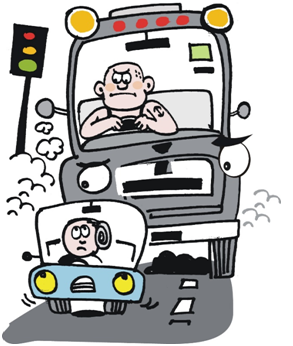You are at the end of a long day and an even longer haul when a four-wheeler pulls in front of you, forcing you to slam on your breaks and nearly jackknifing your rig. The driver makes a rude gesture and speeds off. Your vision goes dark and you grip the steering wheel to keep yourself from retaliating.

What is road rage?
People typically think of road rage aggressive driving. However, the National Highway Traffic Safety Administration says road rage is when a driver “commits moving traffic offenses to endanger other persons or property” It is also defined as a passenger or driver of one vehicle using it or a dangerous weapon to assault people in another vehicle. The NHTSA’s definition places responsibility on the driver and carries criminal charges.
Tips to avoid road rage
Fortunately, preventing road rage is possible. Use these tips to stay calm on your next trip.
Get plenty of sleep
It is much easier to handle difficult situations with grace when you have had enough rest. The National Sleep Foundation recommends seven to nine hours of sleep per night for adults age 18-64. The organization also attributes up to one million crashes per year to drowsy driving. Make sure you are taking your full mandated rest period.
Plan ahead
The next time you are mapping fuel stops for a long haul, build a few extra minutes into each leg of the trip. If weather will be bad, consider alternate routes and any extra time they may take. Whenever possible, do not put yourself in the position of trying to make up time on the road. Doing so can add more stress if you experience delays like multiple red lights or getting stuck behind a slow driver.
Self-awareness
Budget issues, an argument with your partner, or discipline issues with your children can all add up to a ticking time bomb if you do not deal with stress in a healthy way. Learn to recognize the symptoms of anger:
- Rapid heartbeat.
- Tense muscles.
- Clenched fist or jaw.
- Quick breathing.
- “Seeing red” or tunnel vision.
These symptoms are signs that you need to deal with the issues that are causing stress. If you cannot address the problem immediately, make an appointment to resolve it with your loved ones. Having a specific time and day to deal with stressful issues can help you temporarily set it aside to focus on safe driving.
Stay calm
Keep a playlist of smooth jazz or relaxing instrumental music to listen to when you are on the road and feeling stressed. If music is not your style, try an audiobook with a narrator that has a soothing voice.
Stressed people tend to hyperventilate, taking only short, shallow breaths. This reduces the oxygen available to the brain, and makes it more difficult to think logically. Try this trick to calm yourself quickly in a tense situation.
- Pretend your favorite food just came out of the oven. Maybe it is a fresh batch of cookies or a wood fired pizza.
- Inhale the aroma deeply, allowing it to reach the bottom of your lungs.
- Next, pretend you are cooling it off with a long, slow breath through pursed lips.
- Repeat these steps 3-4 times. You will be surprised at the amount of tension that leaves your body.
The exercise seems a little silly, but it uses your imagination to get your mind off the stressful situation. Oxygenating your brain in this way also works as a type of reset button for your body and helps you think clearly.
Put yourself in the other driver’s shoes
Psychologists say that people under the effect of road rage can commit terrible acts because they look at the other driver as an object rather than as a person. The last thing most of us want to do is consider the other person’s point of view, but it does help. Think of reasons they might have been speeding or careless. Sometimes the only reason is that they are acting like a jerk, but try to give them the benefit of the doubt.
Choose to forgive
When you recognize anger or tension in your body, acknowledge it. You may even choose to speak your feelings and the reason for them aloud. Once you have recognized your feelings, choose to forgive the person who has wronged you. Forgiving does not mean that what they did was okay; it means you are not going to allow it to ruin your day.
Forgiveness carries significant health benefits. Per Mayo Clinic, people who regularly forgive have stronger immune systems, healthier blood pressure levels, and are less prone to depression.

Road rage safety tips
What if someone else is the problem? Use these tips to diffuse a bad situation with an angry driver.
Be courteous
Sometimes it helps to think of meeting the other person in a more formal setting. You would not yell across a dinner table or shake your fist at someone you have just met. When in doubt, use good manners and treat others the way you would want to be treated.
Let tailgating drivers pass
Tailgaters pose a serious driving hazard, especially since they tend to hang out in a driver’s blind spot. Slow down and allow them to pass. The end goal is for both of you to arrive safely at your destination. No one wins if you are both engaged in a reckless race.
Consider your own driving
Is it possible that you accidently cut someone off? Maybe you used your horn to express frustration rather than as a warning signal. Consider whether your behavior contributed to tension with another driver or motorist. Sometimes an apologetic wave is enough to diffuse the situation.
Avoid escalation
Finally, avoid antagonizing an angry driver that refuses to calm down or displays erratic behavior. Remember, he or she is not thinking clearly and may not be seeing straight. Do not make eye contact. Allow them to pass as soon as possible. If necessary, pull off the road at a safe place with plenty of witnesses. Contact the Highway Patrol with license information and a description of the vehicle to keep other drivers safe.



 Despite COVID-19 cases still rising, the Commercial Vehicle Safety Alliance has announced that this week Brake Safety Week 2020 wi...
Despite COVID-19 cases still rising, the Commercial Vehicle Safety Alliance has announced that this week Brake Safety Week 2020 wi...

